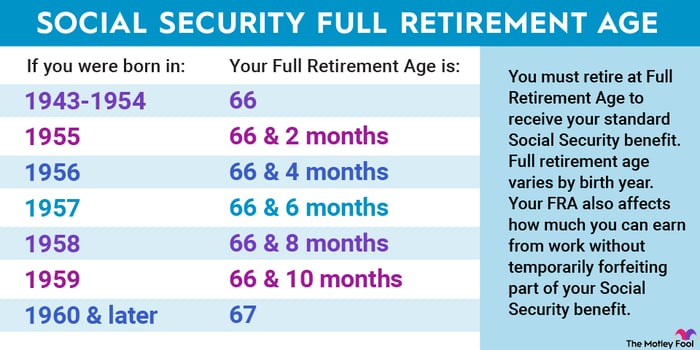If you’re going to be relying on Social Security to any extent in retirement, it pays to understand as much as possible about how the program works. That’s often easier said than done, as Social Security can be incredibly complex and confusing at times.
However, if there’s one factor to fully grasp, it’s your full retirement age (FRA) and how it will affect your benefit amount. There’s one extremely misunderstood component of the FRA, and it could cost the average retiree around $4,560 per year.
Where to invest $1,000 right now? Our analyst team just revealed what they believe are the 10 best stocks to buy right now. See the 10 stocks »

Image source: Getty Images.
What is your full retirement age (FRA)?
Your FRA is the age at which you’ll receive 100% of your benefit amount based on your earnings history and the length of your career. You can file before or after your FRA, but that will decrease or increase the size of your monthly checks.
If you’re not sure what your FRA is, you’re not alone — the vast majority of U.S. adults are in the same boat. In fact, only 15% of adults could correctly name their FRA, according to a 2024 survey from the Nationwide Retirement Institute. Even among adults aged 50 and older (who are likely much further along in the retirement planning process), just 16% knew their FRA.
The average guess was 61 years old, while those aged 60 to 65 believe, on average, that their FRA is 64 years old. However, age 62 is the earliest you can file for Social Security, and everyone’s FRA will fall between ages 66 and 67, depending on your birth year.

Image source: The Motley Fool.
While this may seem like a simple mistake, it can be incredibly costly. The earlier you file for benefits, the smaller your checks will be. Filing as early as possible will reduce your benefits by up to 30%, and these reductions are permanent. Many people, then, might be filing early when they believe they’re claiming at their FRA — resulting in benefit reductions they weren’t expecting.
The average retiree collects around $1,925 per month in benefits, according to November 2024 data from the Social Security Administration. Let’s say, for example, that you have a FRA of 67 years old, and by filing at that age, you’d receive $1,900 per month.
Let’s also say that you mistakenly believe your FRA is 64 years old. You may file at that age expecting to receive your full $1,900 monthly payments, but in reality, your checks will be slashed by 20% for filing three years early. That will reduce your checks by $380 per month, or $4,560 per year.
How much do these reductions really matter?
The reductions you’ll face for filing early can drastically slash your payments in the short term, but over the long haul, they might not affect your benefits as much as you think.
Social Security is designed so that, in theory, you should collect roughly the same amount over a lifetime no matter when you file. Claiming early will result in smaller checks, but you’ll receive more in total. By delaying claiming, you won’t receive as many payments overall, but each one will be larger.
If you live an average lifespan, you should essentially break even regardless of what age you began claiming. However, if you have reason to believe you’ll live a longer- or shorter-than-average lifespan, it could pay to file at a particular age.
| Age | Average Monthly Benefit Among Retirees |
|---|---|
| 62 | $1,298 |
| 63 | $1,339 |
| 64 | $1,460 |
| 65 | $1,563 |
| 66 | $1,740 |
| 67 | $1,884 |
| 68 | $1,948 |
| 69 | $1,945 |
| 70 | $2,038 |
Data source: Social Security Administration data from December 2023. Table by author.
Filing early can be smart if you don’t expect to live well into your 80s or beyond. You’ll still receive smaller checks, but this option can give you more time to enjoy your benefits. Depending on how long you spend in retirement, you could even collect more in total by filing early than you would by delaying.
On the other hand, waiting a few years to file can be smart if you expect to live far longer than average. Social Security benefits are for life, and those larger checks can go a long way if your savings run dry decades into retirement.
There’s no right or wrong time to take Social Security, but it is important to know exactly how your age will affect your benefit amount. When you know your FRA and have a plan for when you’ll file for benefits, you can avoid any surprises in retirement.
The $22,924 Social Security bonus most retirees completely overlook
If you’re like most Americans, you’re a few years (or more) behind on your retirement savings. But a handful of little-known “Social Security secrets” could help ensure a boost in your retirement income. For example: one easy trick could pay you as much as $22,924 more… each year! Once you learn how to maximize your Social Security benefits, we think you could retire confidently with the peace of mind we’re all after. Simply click here to discover how to learn more about these strategies.
View the “Social Security secrets” »
The Motley Fool has a disclosure policy.
 benzinga.com
benzinga.com fool.com
fool.com



